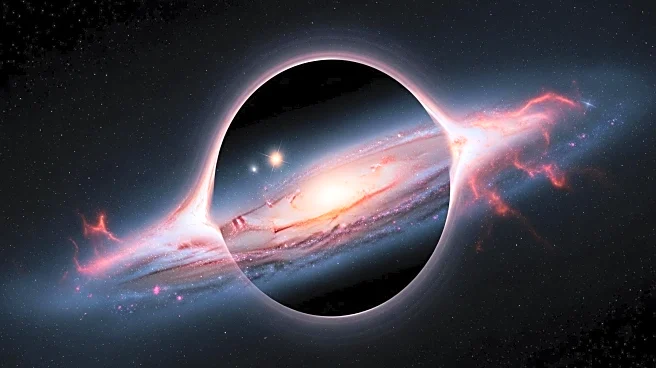What's Happening?
Lior Shamir, a professor at Kansas State University, has proposed that the universe might be trapped inside a black hole. Using data from the James Webb Space Telescope, Shamir analyzed galaxy rotations, finding an unexpected asymmetry in their spin directions. Out of 263 galaxies studied, two-thirds rotated clockwise, while one-third rotated counterclockwise. This finding challenges the expectation that galaxy rotations should be evenly distributed. Shamir suggests the universe's rotation could be inherited from a parent black hole, influencing galaxy dynamics. The research calls for a reevaluation of cosmological theories, including the universe's expansion rates and the age of large galaxies.
Why It's Important?
Shamir's research could redefine understanding of the universe's structure and origins. If the universe is indeed inside a black hole, existing cosmological theories may be incomplete, prompting a reassessment of fundamental concepts. The study highlights the potential influence of a rotating universe on galaxy dynamics, offering new perspectives on cosmic evolution. This research may impact future astronomical studies, encouraging scientists to explore unconventional theories and methodologies. The findings could lead to advancements in understanding the universe's expansion and the behavior of galaxies, influencing both theoretical and observational cosmology.
What's Next?
Further research is needed to validate Shamir's findings and explore their implications for cosmological theories. Astronomers may reconsider the Milky Way's motion in their measurements, potentially resolving discrepancies in the universe's expansion rates. Collaborative efforts between scientists and institutions could lead to new discoveries about the universe's structure and origins. The study may inspire additional investigations into the role of black holes in cosmic evolution, influencing future space missions and telescope observations.
Beyond the Headlines
The research challenges conventional cosmological theories, prompting ethical and philosophical discussions about the nature of the universe. The idea of the universe being inside a black hole raises questions about the limits of human understanding and the potential for new scientific paradigms. The study exemplifies the power of advanced technology, like the James Webb Space Telescope, in expanding knowledge of the cosmos, highlighting the importance of continued investment in space exploration.












